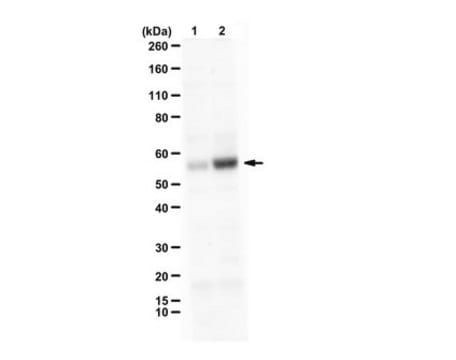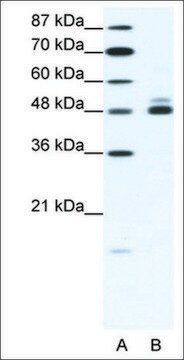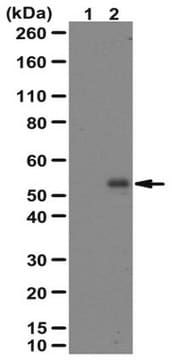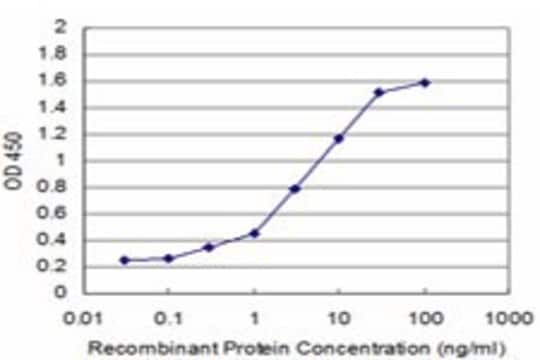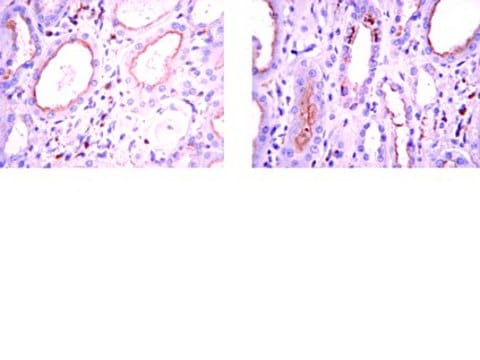06-702
Anti-phospho-Smad1 (Ser463/465) Antibody
Upstate®, from rabbit
Sign Into View Organizational & Contract Pricing
All Photos(1)
About This Item
UNSPSC Code:
12352203
eCl@ss:
32160702
NACRES:
NA.41
Recommended Products
biological source
rabbit
Quality Level
antibody form
purified immunoglobulin
antibody product type
primary antibodies
clone
polyclonal
species reactivity
human, Xenopus, rat, mouse
manufacturer/tradename
Upstate®
technique(s)
western blot: suitable
isotype
IgG
NCBI accession no.
UniProt accession no.
shipped in
dry ice
target post-translational modification
phosphorylation (pSer463/pSer465)
Gene Information
human ... SMAD1(4086)
General description
Smad proteins, the mammalian homologs of the Drosophila Mothers against dpp (Mad), function downstream of TGF-β receptor Serine/Threonine kinases and undergo serine phosphorylation in response to receptor activation. Following BMP (bone morphogenic protein) or TGF-β binding to the targeted surface receptors, Smad1 (also designated Madr1 or JV4-1) becomes phosphorylated at Ser 463 and Ser 465. Activated Smad1 associates with Smad4 and translocates to the nucleus, where the Smad1/Smad4 complex recruits DNA-binding proteins to activate specific gene transcription. BMP binding induces phosphorylation of Smad1, which enhances the binding of Smad1 to CBP to stimulate Smad1-dependent transcription. In addition, ALK1 and ALK2 specifically phosphorylate Smad1 on residues located in the MH2 domain and induces Smad1-dependent pathways.
Specificity
Recognizes the dual serine phosphorylated Smad1 (Ser463/465).
Immunogen
peptide corresponding to (CGGSPHNPISpSVpSGG) corresponding to amino acids 455-465 of human Smad1 protein
Application
Detect phospho-Smad1 (Ser463/465) with Anti-phospho-Smad1 (Ser463/465) Antibody (Rabbit Polyclonal Antibody), that has been shown to work in WB.
Quality
routinely evaluated by immunoblot on RIPA lysates from P19 (mouse embryonal carcinoma) cells treated with BMP4
Target description
65 kDa
Physical form
Format: Purified
Analysis Note
Control
BMP-4-treated HeLa or NIH/3T3 cells
BMP-4-treated HeLa or NIH/3T3 cells
Other Notes
Concentration: Please refer to the Certificate of Analysis for the lot-specific concentration.
Legal Information
UPSTATE is a registered trademark of Merck KGaA, Darmstadt, Germany
Not finding the right product?
Try our Product Selector Tool.
recommended
Storage Class
10 - Combustible liquids
wgk_germany
WGK 1
Certificates of Analysis (COA)
Search for Certificates of Analysis (COA) by entering the products Lot/Batch Number. Lot and Batch Numbers can be found on a product’s label following the words ‘Lot’ or ‘Batch’.
Already Own This Product?
Find documentation for the products that you have recently purchased in the Document Library.
Arseniy R Morov et al.
Open biology, 6(6) (2016-06-17)
Acquisition of dorsal structures, such as notochord and hollow nerve cord, is likely to have had a profound influence upon vertebrate evolution. Dorsal formation in chordate development thus has been intensively studied in vertebrates and ascidians. However, the present understanding
C Gruendler et al.
The Journal of biological chemistry, 276(49), 46533-46543 (2001-09-26)
The bone morphogenetic proteins (BMPs) regulate early embryogenesis and morphogenesis of multiple organs, such as bone, kidney, limbs, and muscle. Smad1 is one of the key signal transducers of BMPs and is responsible for transducing receptor activation signals from the
TGFbeta-mediated activation of Smad1 in B-cell non-Hodgkin's lymphoma and effect on cell proliferation.
Munoz, O; Fend, F; de Beaumont, R; Husson, H; Astier, A; Freedman, AS
Leukemia null
Mallappa Anitha et al.
American journal of physiology. Gastrointestinal and liver physiology, 298(3), G375-G383 (2009-12-17)
The bone morphogenetic protein (BMP) family is a class of transforming growth factor (TGF-beta) superfamily molecules that have been implicated in neuronal differentiation. We studied the effects of BMP2 and glial cell line-derived neurotrophic factor (GDNF) on inducing differentiation of
BMP signaling dynamics in embryonic orofacial tissue.
Partha Mukhopadhyay,Cynthia L Webb,Dennis R Warner,Robert M Greene,M Michele Pisano
Journal of Cellular Physiology null
Our team of scientists has experience in all areas of research including Life Science, Material Science, Chemical Synthesis, Chromatography, Analytical and many others.
Contact Technical Service
